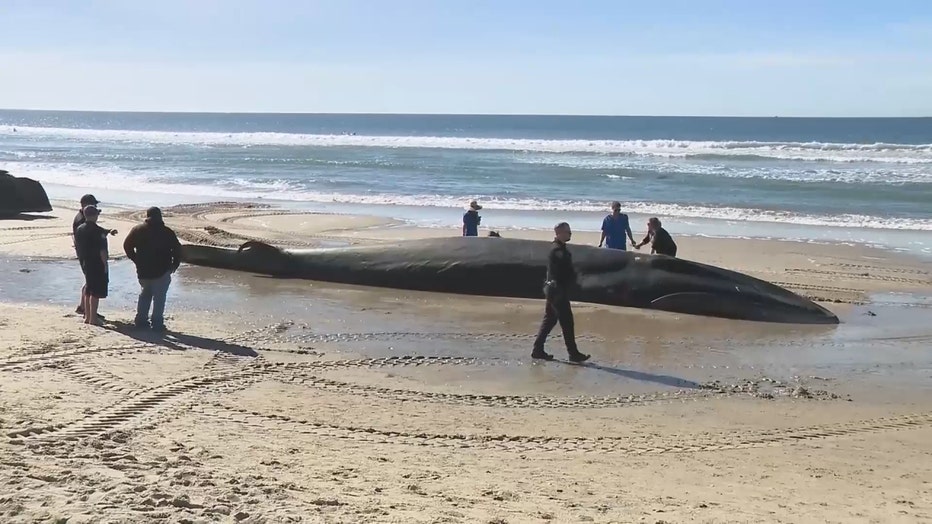Massive 52-foot fin whale washes up on San Diego's Pacific Beach

Massive 52-foot fin whale washes ashore on San Diego beach
A giant whale washed ashore on a San Diego beach on Dec. 10, 2023. FOX's Christelle Koumou? reports.
SAN DIEGO - A 52-foot fin whale was found washed up on the shores of San Diego early Sunday, prompting a crowd of hundreds who gathered to see the massive marine mammal.
The beached fin whale was reported at about 8 a.m. local time on San Diego’s Pacific Beach to the National Oceanic and Atmospheric Administration (NOAA), FOX 5 San Diego reported. NOAA officials said the young female whale was dead upon their arrival.
"We thought it was a tarp from out in the water, but eventually we realized it was a whale and I’ve never seen anything like it," surfer Nick Hennis told FOX 5 San Diego.
RELATED: Rare blonde raccoon becomes frequent visitor at Iowa home
Fin whales can grow up to 80 feet long and are the second-largest whale species in the world after the blue whale.
NOAA research biologist Kerri Danil told the local news station on Sunday that the cause of the whale’s death remained unclear, but it appeared to not be caused by humans.
"We did see signs or evidence of perhaps scavenging from sharks," Danil said. "There were some rake marks in it, but nothing that would have killed this animal."

The 52-foot fin whale is pictured on Dec. 10, 2023, in San Diego, California. (Credit: FOX 5 San Diego)
After the whale was found, heavy construction trucks attempted for hours to roll the whale to the water’s edge. Once that was successful, lifeguards tied ropes around its tail to tow it offshore, according to FOX 5 San Diego.
Considered an endangered species, there are between 50,000 and 90,000 fin whales estimated to be left in the world after a century of hunting by commercial whalers, according to the World Wildlife Fund (WWF).
Commercial whaling largely ended in the 1970s and 1980s, though some subsistence hunting occurs today in Greenland under sustainable quotas allowed by the International Whaling Commission, NOAA says.
Overall, fin whales still face threats, including climate change, lack of prey due to overfishing, and vessel strikes.
"The most common thing that kills those fin whales, or finback whales, are ship strikes, the rudders off of ships," San Diego State University Geologist Professor Emeritus Pat Abbot told FOX 5 San Diego.
While NOAA researchers at the scene didn’t believe that was the case for the beached whale on San Diego’s Pacific Beach, Abbot said another possible cause could have been a virus.
RELATED: Unexpected guest drops in on podcast, upstaging discussion
This story was reported from Cincinnati.

